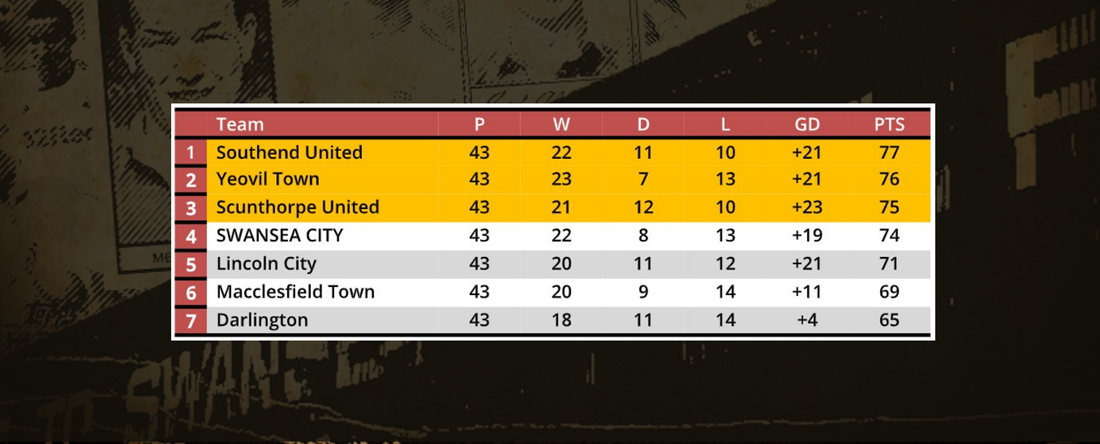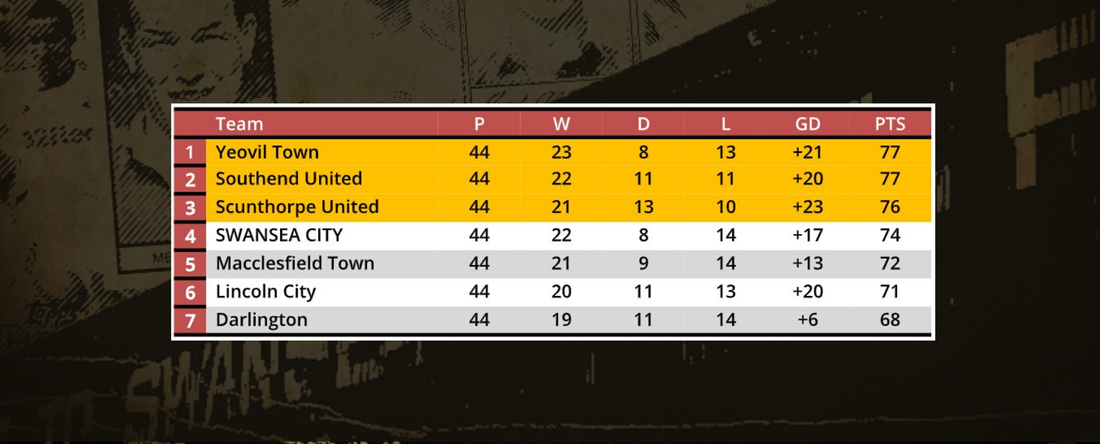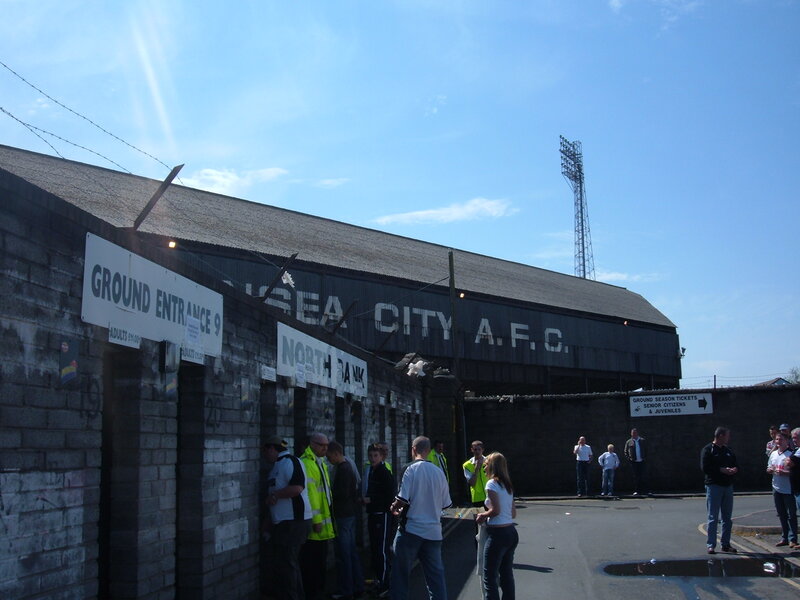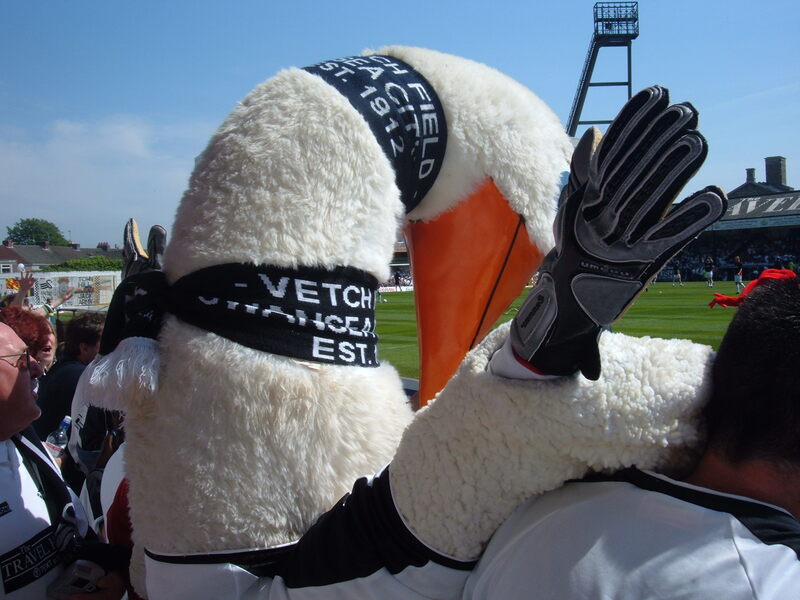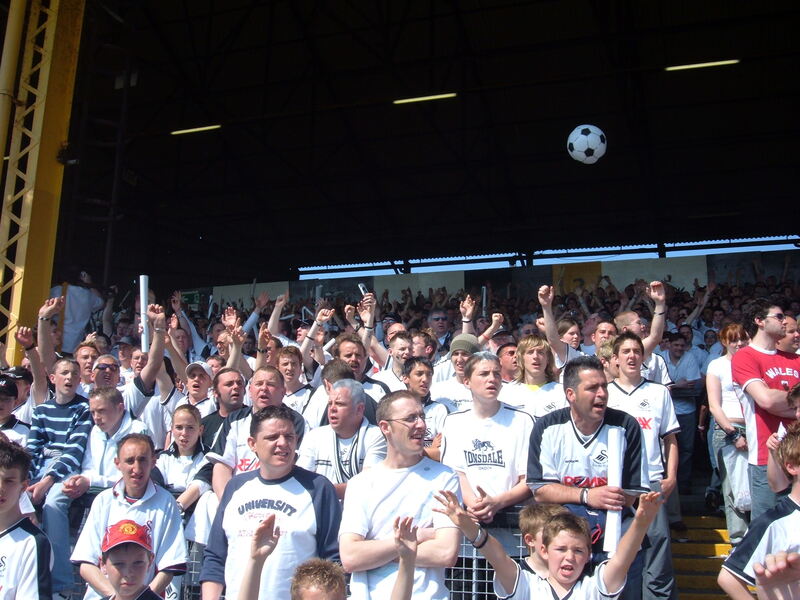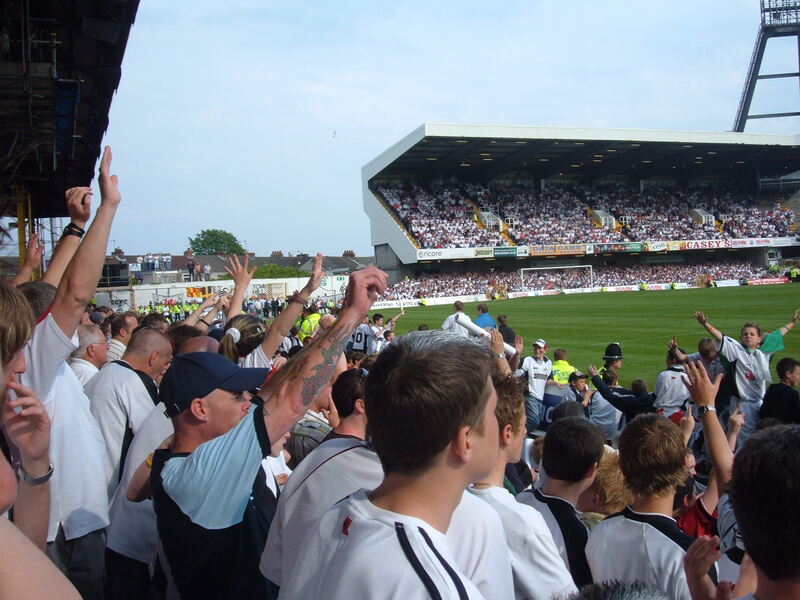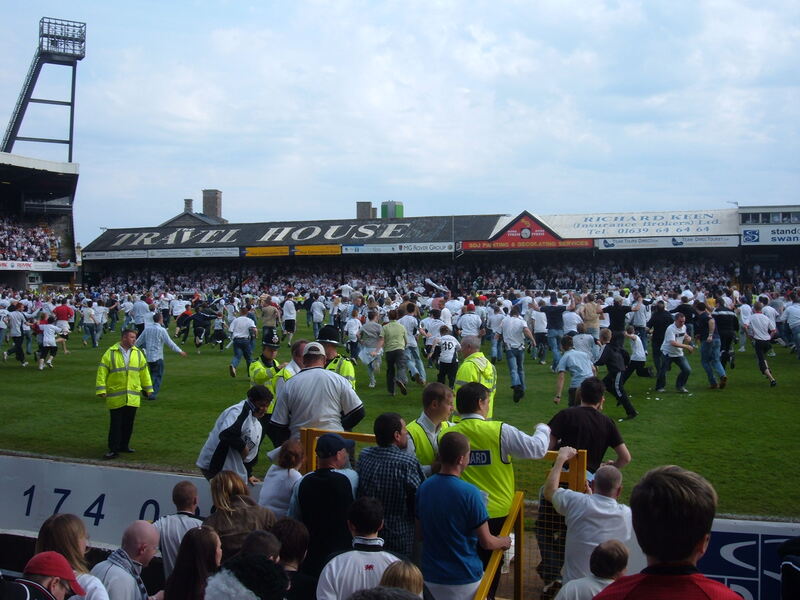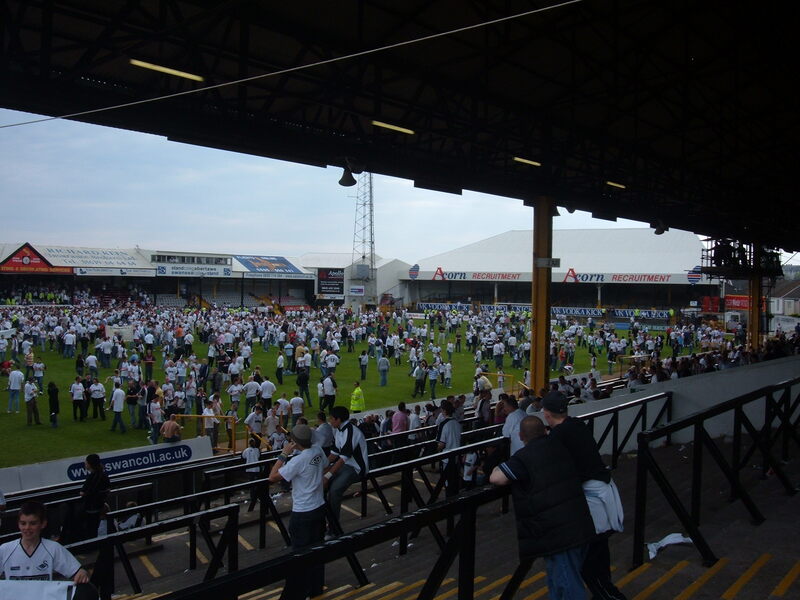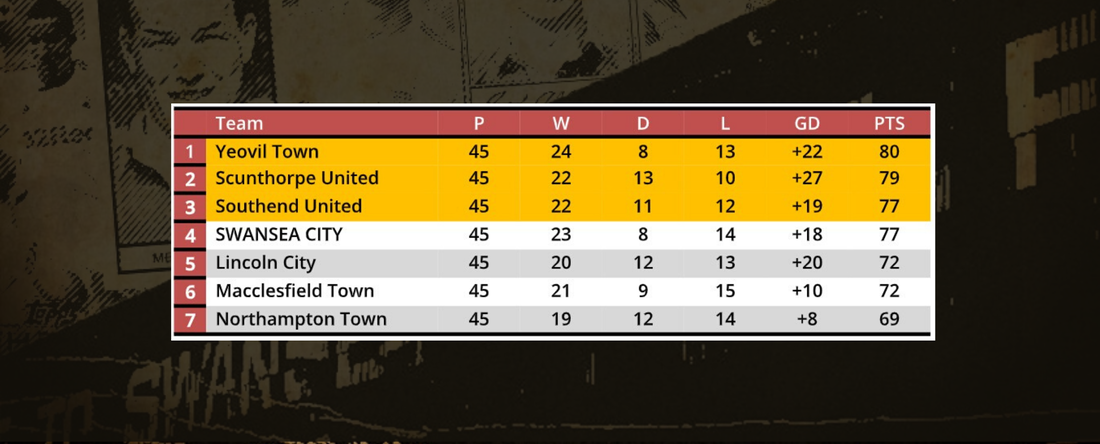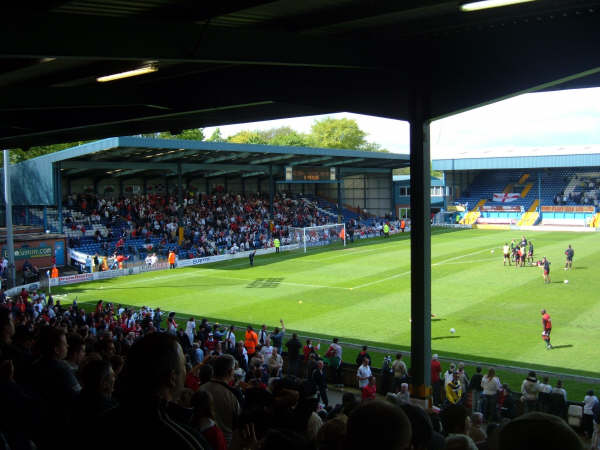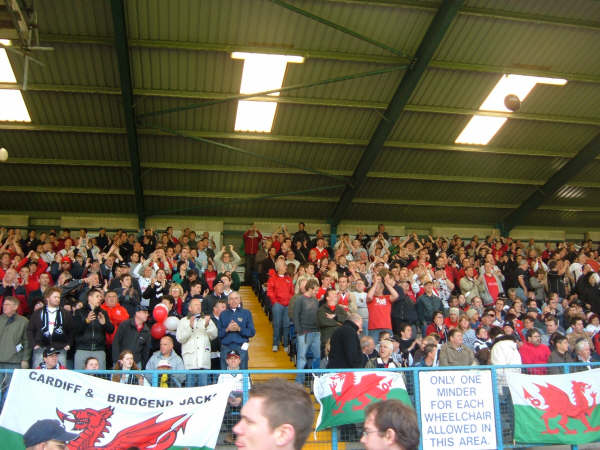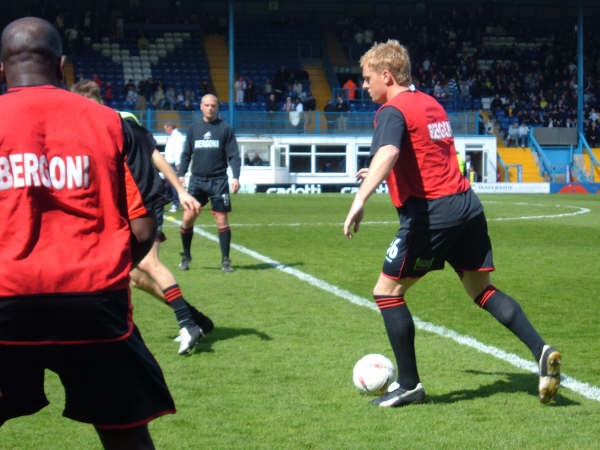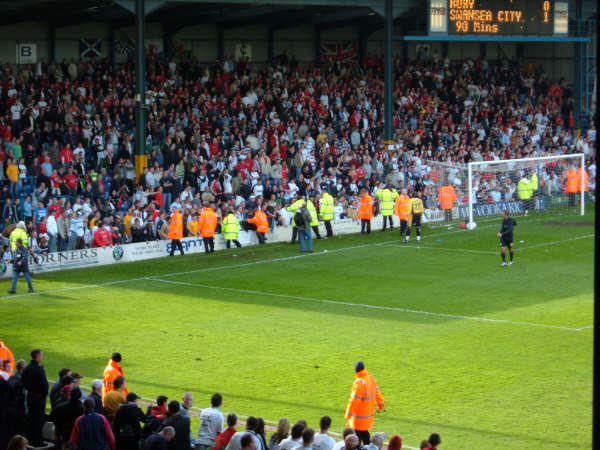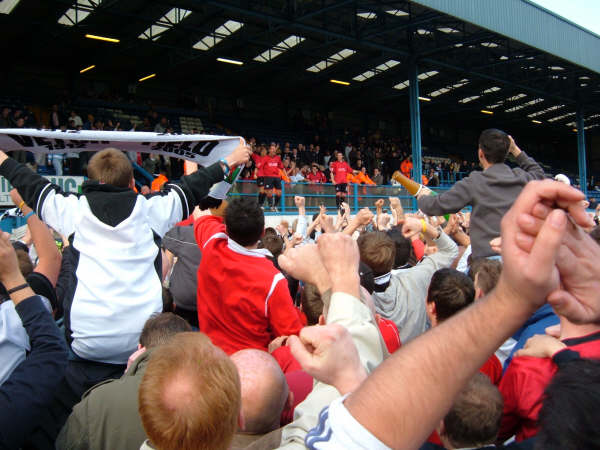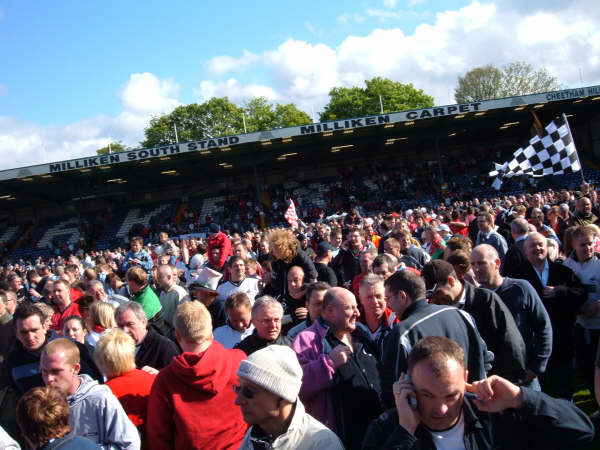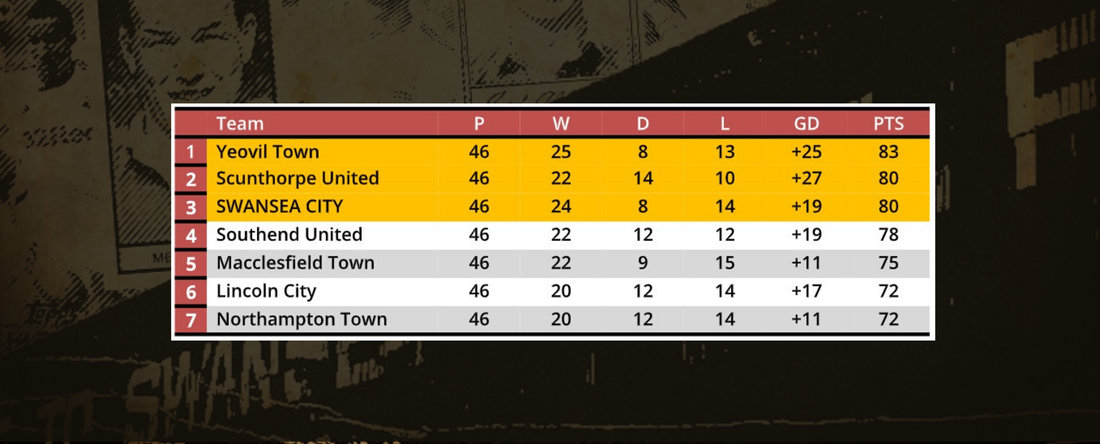Remembering the Vetch Field – 10 Years On
In 2015, to commemorate the 10th anniversary of Swansea City's last season at the Vetch Field, I wrote a series of posts for the now unfortunately defunct 'The Swansea Way' website, looking back at five significant games at the end of that historic final campaign.
Swansea City 1–0 Oxford United, 15th April 2005
This was it. The end of Swansea City’s 93-year stay on a former (and future) vegetable patch was in sight. We’d already had one significant ‘last’ – the extra time loss to Reading in a 3rd Round replay back in January being the ground’s final taste of the FA Cup – but this, the Vetch Field’s last game under floodlights, really did feel like the beginning of the end.
My first game was a night game: Barry Town in the 1998/99 FAW Premier Cup group stage. We drew 1–1, with Tony Bird scoring. It seems a bit clichéd to say it now, but I’m sure the fact that the game was floodlit had something to do with my instant love of the Swans. That first glimpse of a bright green pitch, stretching out beneath the black sky of Swansea Bay as you walked up the ramp to the North Bank, has been cited as the point of love at first sight for many a diehard Jack. There’s still a faint pang of this feeling for night games at the Liberty, but you couldn’t beat a match under the Vetch floodlights – the frosty collective breath of the East Stand on the back of the visiting goalkeeper’s neck; the sight of kids squinting under the too-bright strip lights of the Centre Stand; the entire North Bank channeling Elvis with a second-half rendition of 'Can’t Help Falling in Love'; and nine Boston United fans scattered across the Away End, having come on a skateboard.
Technically, the FAW Premier Cup Final against Wrexham – the Vetch Field’s last ever Swans game of any kind – was the ground’s last ever night game. However, as it took place almost a month later on 11th May, and with an earlier kick-off time of 6.55pm, the Wrexham game was played out almost entirely in daylight. Photographs of the swarm of souvenir hunters on the pitch after the final whistle show a blue sky beyond the floodlights, not something I would particularly associate with a night game at the Vetch. It’s open to debate, of course, because 6.55pm definitely isn’t an afternoon kick-off – but I’ve always considered the league fixture on that Friday night in April to be the Vetch Field’s last proper night game, and it was certainly billed as such right up until the Swans beat Total Network Solutions on penalties to reach their third FAW Premier Cup Final.
My first game was a night game: Barry Town in the 1998/99 FAW Premier Cup group stage. We drew 1–1, with Tony Bird scoring. It seems a bit clichéd to say it now, but I’m sure the fact that the game was floodlit had something to do with my instant love of the Swans. That first glimpse of a bright green pitch, stretching out beneath the black sky of Swansea Bay as you walked up the ramp to the North Bank, has been cited as the point of love at first sight for many a diehard Jack. There’s still a faint pang of this feeling for night games at the Liberty, but you couldn’t beat a match under the Vetch floodlights – the frosty collective breath of the East Stand on the back of the visiting goalkeeper’s neck; the sight of kids squinting under the too-bright strip lights of the Centre Stand; the entire North Bank channeling Elvis with a second-half rendition of 'Can’t Help Falling in Love'; and nine Boston United fans scattered across the Away End, having come on a skateboard.
Technically, the FAW Premier Cup Final against Wrexham – the Vetch Field’s last ever Swans game of any kind – was the ground’s last ever night game. However, as it took place almost a month later on 11th May, and with an earlier kick-off time of 6.55pm, the Wrexham game was played out almost entirely in daylight. Photographs of the swarm of souvenir hunters on the pitch after the final whistle show a blue sky beyond the floodlights, not something I would particularly associate with a night game at the Vetch. It’s open to debate, of course, because 6.55pm definitely isn’t an afternoon kick-off – but I’ve always considered the league fixture on that Friday night in April to be the Vetch Field’s last proper night game, and it was certainly billed as such right up until the Swans beat Total Network Solutions on penalties to reach their third FAW Premier Cup Final.
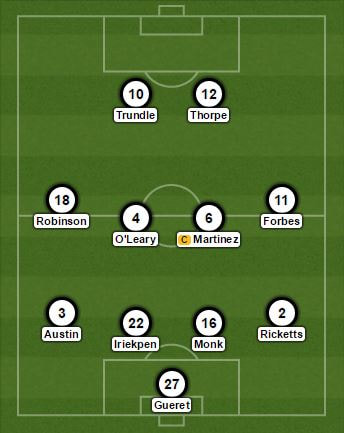 Swans line-up vs. Oxford United, 15th April 2005
Swans line-up vs. Oxford United, 15th April 2005
The visiting fans on that mid-April night were from Oxford, cheering on a team that, with four games left to play, still had a mathematical chance of sneaking into the League Two play-offs. If they made it, they could face the Swans. A five-game unbeaten run, stretching between 12th March and 9th April, had reignited the automatic promotion hopes of Kenny Jackett’s side, but an injury-time own goal from Garry Monk at Lincoln saw the Swans lose 1–0 and slip back into the play-off positions. This historic game against Oxford United, the penultimate home game of a long, hard campaign, was now being marked down as ‘must win’.
From the very beginning of that final season at the Vetch, it had been quite clear that many fans, myself included, were desperate for promotion. Our beloved tin shed deserved the biggest send off we could manage, and playing basement-division football at the shiny new stadium down the road in Landore was unthinkable. Having to deal with the drama of the play-offs was daunting – the last game at the Vetch ending in the disappointment of a semi-final defeat to Darlington or Northampton was painful enough to just imagine. But if we could pick up a win against Oxford – by any means – and hope that Southend slipped up at home to Leyton Orient, we’d be back on track.
Those nervous thoughts of not delivering something to celebrate had transferred from the stands onto the pitch by the time Oxford came to SA1. The game was tense and scrappy, a stop-start affair settled by a Kris O’Leary strike just before half time. Though the Swans side was generously filled with crowd favourites, the football on show was a far cry from the free-flowing passing game that would bring Roberto Martínez and Garry Monk, both starters on the night, their plaudits as Swans managers in the years that followed.
A 70th-minute second yellow for Oxford’s Uruguayan defender Mateo Corbo eased the tension, and Jackett’s men made it over the line, buoyed at the final whistle by news that Orient had managed to take all three points home with them from Essex. The Swans remained outside the automatic promotion places, but only below Southend on goal difference. A win away at Bristol Rovers the following week would put pressure on their rivals, and perhaps, if results went their way, allow the team to clinch automatic promotion at home to Shrewsbury Town on 30th April – the Vetch Field’s final league fixture.
Of course, that would have been nice but, as a certain strawberry-blonde skipper put it in a post-match interview at Wembley Stadium just six short years later: “Swansea…we don’t do it easy do we!”
Note: Calling the Vetch Field a former vegetable patch is probably incorrect, as ‘vetch’ is a actually a type of flowering plant, not a cabbage as commonly misreported. However, for the sake of poetic licence, let’s just pretend that one of the Swansea Gaslight Company workers used to grow his carrots on the future site of the Harry Griffiths bar.
From the very beginning of that final season at the Vetch, it had been quite clear that many fans, myself included, were desperate for promotion. Our beloved tin shed deserved the biggest send off we could manage, and playing basement-division football at the shiny new stadium down the road in Landore was unthinkable. Having to deal with the drama of the play-offs was daunting – the last game at the Vetch ending in the disappointment of a semi-final defeat to Darlington or Northampton was painful enough to just imagine. But if we could pick up a win against Oxford – by any means – and hope that Southend slipped up at home to Leyton Orient, we’d be back on track.
Those nervous thoughts of not delivering something to celebrate had transferred from the stands onto the pitch by the time Oxford came to SA1. The game was tense and scrappy, a stop-start affair settled by a Kris O’Leary strike just before half time. Though the Swans side was generously filled with crowd favourites, the football on show was a far cry from the free-flowing passing game that would bring Roberto Martínez and Garry Monk, both starters on the night, their plaudits as Swans managers in the years that followed.
A 70th-minute second yellow for Oxford’s Uruguayan defender Mateo Corbo eased the tension, and Jackett’s men made it over the line, buoyed at the final whistle by news that Orient had managed to take all three points home with them from Essex. The Swans remained outside the automatic promotion places, but only below Southend on goal difference. A win away at Bristol Rovers the following week would put pressure on their rivals, and perhaps, if results went their way, allow the team to clinch automatic promotion at home to Shrewsbury Town on 30th April – the Vetch Field’s final league fixture.
Of course, that would have been nice but, as a certain strawberry-blonde skipper put it in a post-match interview at Wembley Stadium just six short years later: “Swansea…we don’t do it easy do we!”
Note: Calling the Vetch Field a former vegetable patch is probably incorrect, as ‘vetch’ is a actually a type of flowering plant, not a cabbage as commonly misreported. However, for the sake of poetic licence, let’s just pretend that one of the Swansea Gaslight Company workers used to grow his carrots on the future site of the Harry Griffiths bar.
Bristol Rovers 2–0 Swansea City, 23rd April 2005
Swansea City don’t do things the easy way. As a club, we like to get our money’s worth, to squeeze every last drop of agony and ecstasy out of each situation we find ourselves in. The men in black and white may sometimes look like they’re in control of the wheel, but you can guarantee there’ll be more than a few potholes dotted along the road in front of them. Of course, some fans will point towards the 5–0 victory in the 2013 League Cup Final, or the 92 points that brought the League One title to the Liberty in 2008, but I’ll raise you the nail-biting second half of the 2011 Championship Play-Off Final at Wembley, or going from 2–1 down to 4–2 up against Hull at the Vetch in 2003 to avoid relegation to the Conference. More often than not, these situations end with a sigh of relief, and maybe a pitch invasion (or two), but not before our team has put every last one of us through the wringer. The end of the 2004/05 campaign, the last season at the Vetch, was no different.
With just 3 games of the regular season left to play, the Swans were in 4th position in League Two, outside the automatic promotion places by a point. Not exactly in control of the wheel, but in a good place to put pressure on the three teams above them: Southend, Yeovil and Scunthorpe. In their previous game, a nervous Swans side had beaten Oxford United 1–0 at home to move level on points with Southend in 3rd, but the boys from Essex had since played their game in hand, recording a 2–1 win over Macclesfield that had seen them jump to the top of the pile. Things were getting complicated.
With Southend winning that game in hand, the possibility of achieving automatic promotion at home to Shrewsbury Town on 30th April – the Vetch Field’s final league fixture – had now gone. However, with Southend and Yeovil still to play each other, if Kenny Jackett's men could successfully navigate a tricky away trip at Bristol Rovers, there was a strong chance that the Swans could go into their final league fixture of the season, away at Bury on 7th May, with their fate in their own hands.
But that was never going to happen.
With just 3 games of the regular season left to play, the Swans were in 4th position in League Two, outside the automatic promotion places by a point. Not exactly in control of the wheel, but in a good place to put pressure on the three teams above them: Southend, Yeovil and Scunthorpe. In their previous game, a nervous Swans side had beaten Oxford United 1–0 at home to move level on points with Southend in 3rd, but the boys from Essex had since played their game in hand, recording a 2–1 win over Macclesfield that had seen them jump to the top of the pile. Things were getting complicated.
With Southend winning that game in hand, the possibility of achieving automatic promotion at home to Shrewsbury Town on 30th April – the Vetch Field’s final league fixture – had now gone. However, with Southend and Yeovil still to play each other, if Kenny Jackett's men could successfully navigate a tricky away trip at Bristol Rovers, there was a strong chance that the Swans could go into their final league fixture of the season, away at Bury on 7th May, with their fate in their own hands.
But that was never going to happen.
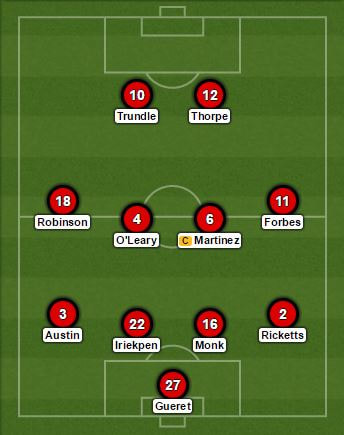 Swans line-up vs. Bristol Rovers, 23rd April 2005
Swans line-up vs. Bristol Rovers, 23rd April 2005
The various stadiums of Bristol Rovers have never been happy hunting grounds for Swansea City. When Kenny Jackett’s men made the short trip across the Severn on Saturday 23rd April 2005, the Swans’ record away to The Gas read 'P38 W6 D12 L20'. Their last victory in the fixture had come on New Year’s Day 1994 – a 2–1 win during Rovers’ exile at Bath City’s Twerton Park – but since that tactical masterclass from Frankie Burrows, the Swans had brought just 1 point home with them from a possible 18.
So when Andy Robinson received his second red card of the season on the stroke of half-time, with the Swans already trailing 2–0, there couldn't have been too many surprised faces in amongst the 1,350 travelling Jacks in the Memorial Ground. Despite their mid-table position, Bristol Rovers were a tidy team – spearheaded by a strike partnership of Junior Agogo and Richard Walker, who would end the season with 35 goals between them. As if they needed it, both players were gifted a goal by the Swans in a frustrating first half display, made even worse by Robinson seeing red for an attempted headbutt on Ryan Williams in the 45th minute.
Jackett made three positive substitutions early in the second half – bringing on Leon Britton (then a tricky winger, rather than a cultured central midfielder), Kevin McLeod and Paul Connor – as his promotion hopefuls went for broke. Despite being a man down, the Swans managed to maintain a high intensity for much of the second period, but a chance each for Iriekpen and Connor was about as good as it got.
A red card for Rovers captain James Hunt in the 89th minute came too late for the Swans to take advantage, and the final whistle confirmed their fourteenth defeat of the season. The gravity of the missed opportunity became apparent as news filtered through that Southend, Yeovil and Scunthorpe had all dropped points against lesser teams, leaving the top of the League Two table wide open (though there was some comfort in the fact that all three could still realistically be caught).
Looking at it now, the team sheet for that afternoon in Bristol is packed full of fan favourites, with very little filler. But to put those players in the context of the 2004/05 season, those we now consider to be club legends, or at least cult heroes, were nothing more than custodians of the shirt at the time. Though there was already a lot of justified love from the stands for Britton, Martínez and Trundle, the trio were all coming towards the end of just their second full season in SA1. Garry Monk – signed by Jackett 10 months earlier – was a fifth of a solid basement-division defence, celebrated no more than Matthew Bound and Jason Smith had been in the Division Three championship-winning season of 1999/00. And, although he had enjoyed a decent debut season, Adrian Forbes – who probably leans more towards cult hero status than Robbie James Wall of Fame material – was yet to score the two goals that would write his name into Swansea City folklore.
Had this team not achieved promotion at the end of that season, you wonder how many of its playing members would have stuck around for the opening of the New Stadium (as the Liberty was then known). If Jackett had taken charge of another campaign in the bottom division, it's quite likely he would have had another stab at getting rid of Britton, Martínez and Trundle – three players that he clearly hadn’t fancied at the beginning of his reign. Sam Ricketts and Andy Robinson, who had both been recently plucked from non-league obscurity by the Swans, were probably starting to realise that they were too good for League Two (Ricketts even more so, having just been handed his first Welsh cap by John Toshack). If the Swans hadn’t eventually delivered ecstasy in place of agony at the end of that final campaign at the Vetch, we might have kicked off our first season at the Liberty with a front pairing of Lee Thorpe and Paul Connor – two players who definitely had goals in them at that level, but none of the magic found in Lee Trundle’s white daps.
With time in the regular season running out for Jackett's Swans, promotion to League One could still be achieved via the play-offs – but nobody wanted the possibility of having semi-final heartbreak as their last memory of the Vetch Field. Following that demoralising defeat at Bristol Rovers, back-to-back wins in the Swans’ two final games of the league season – Shrewsbury at home and Bury away – were all that would do.
So when Andy Robinson received his second red card of the season on the stroke of half-time, with the Swans already trailing 2–0, there couldn't have been too many surprised faces in amongst the 1,350 travelling Jacks in the Memorial Ground. Despite their mid-table position, Bristol Rovers were a tidy team – spearheaded by a strike partnership of Junior Agogo and Richard Walker, who would end the season with 35 goals between them. As if they needed it, both players were gifted a goal by the Swans in a frustrating first half display, made even worse by Robinson seeing red for an attempted headbutt on Ryan Williams in the 45th minute.
Jackett made three positive substitutions early in the second half – bringing on Leon Britton (then a tricky winger, rather than a cultured central midfielder), Kevin McLeod and Paul Connor – as his promotion hopefuls went for broke. Despite being a man down, the Swans managed to maintain a high intensity for much of the second period, but a chance each for Iriekpen and Connor was about as good as it got.
A red card for Rovers captain James Hunt in the 89th minute came too late for the Swans to take advantage, and the final whistle confirmed their fourteenth defeat of the season. The gravity of the missed opportunity became apparent as news filtered through that Southend, Yeovil and Scunthorpe had all dropped points against lesser teams, leaving the top of the League Two table wide open (though there was some comfort in the fact that all three could still realistically be caught).
Looking at it now, the team sheet for that afternoon in Bristol is packed full of fan favourites, with very little filler. But to put those players in the context of the 2004/05 season, those we now consider to be club legends, or at least cult heroes, were nothing more than custodians of the shirt at the time. Though there was already a lot of justified love from the stands for Britton, Martínez and Trundle, the trio were all coming towards the end of just their second full season in SA1. Garry Monk – signed by Jackett 10 months earlier – was a fifth of a solid basement-division defence, celebrated no more than Matthew Bound and Jason Smith had been in the Division Three championship-winning season of 1999/00. And, although he had enjoyed a decent debut season, Adrian Forbes – who probably leans more towards cult hero status than Robbie James Wall of Fame material – was yet to score the two goals that would write his name into Swansea City folklore.
Had this team not achieved promotion at the end of that season, you wonder how many of its playing members would have stuck around for the opening of the New Stadium (as the Liberty was then known). If Jackett had taken charge of another campaign in the bottom division, it's quite likely he would have had another stab at getting rid of Britton, Martínez and Trundle – three players that he clearly hadn’t fancied at the beginning of his reign. Sam Ricketts and Andy Robinson, who had both been recently plucked from non-league obscurity by the Swans, were probably starting to realise that they were too good for League Two (Ricketts even more so, having just been handed his first Welsh cap by John Toshack). If the Swans hadn’t eventually delivered ecstasy in place of agony at the end of that final campaign at the Vetch, we might have kicked off our first season at the Liberty with a front pairing of Lee Thorpe and Paul Connor – two players who definitely had goals in them at that level, but none of the magic found in Lee Trundle’s white daps.
With time in the regular season running out for Jackett's Swans, promotion to League One could still be achieved via the play-offs – but nobody wanted the possibility of having semi-final heartbreak as their last memory of the Vetch Field. Following that demoralising defeat at Bristol Rovers, back-to-back wins in the Swans’ two final games of the league season – Shrewsbury at home and Bury away – were all that would do.
Swansea City 1–0 SHREWSBURY TOWN, 30TH April 2005
Swansea Town’s first ever league fixture took place at the Vetch Field on 7th September 1912. Back then, the team’s nickname was 'the Town' rather than 'the Swans', and its fans were described as 'Soccerites', not the 'Jack Army'. Ivor Allchurch wouldn’t pull on the white shirt for another 35 years, and almost seven decades would pass before goals from Leighton James, Tommy Craig and Jeremy Charles would send the Swans to the top flight of English football for the first time in their history.
The opponents for that Southern League Second Division game were Cardiff City (who else?), providing the first competitive test for player-manager Walter Whittaker’s side following a string of warm-up matches. The newly-formed club had leased a site known locally as the 'Vetch Field' from the Swansea Gaslight Company, with the intention of turning what was essentially a waste land into something that resembled a football ground. By the time Cardiff arrived at the Vetch in September 1912, what had been previously used as the town council’s dumping ground had been levelled out, though the harsh surface still required players to wear knee pads. The upstarts from Swansea surprised Cardiff – 13 years their elder – by taking the lead through Billy Ball. However, the 'Citizens' soon equalised, and the match finished in a 1–1 draw. 92 years, 7 months and 23 days after that first meeting with their future fierce rivals, Swansea would line up on the Vetch turf for the ground’s final league fixture: a game against Shrewsbury Town that would have a big say in the outcome of a long, hard season in the Football League’s basement division.
Kenny Jackett’s Swans began the day in 4th position in the League Two table, just outside the automatic promotion places. After losing 2–0 at Bristol Rovers the previous Saturday, Jackett knew that his team couldn’t afford another slip up if they were to avoid the lottery of the play-offs. In his programme notes, the Swans manager highlighted the need for back-to-back wins in their final two fixtures of the regular league season, a feat that would put pressure on the three teams above them:
The opponents for that Southern League Second Division game were Cardiff City (who else?), providing the first competitive test for player-manager Walter Whittaker’s side following a string of warm-up matches. The newly-formed club had leased a site known locally as the 'Vetch Field' from the Swansea Gaslight Company, with the intention of turning what was essentially a waste land into something that resembled a football ground. By the time Cardiff arrived at the Vetch in September 1912, what had been previously used as the town council’s dumping ground had been levelled out, though the harsh surface still required players to wear knee pads. The upstarts from Swansea surprised Cardiff – 13 years their elder – by taking the lead through Billy Ball. However, the 'Citizens' soon equalised, and the match finished in a 1–1 draw. 92 years, 7 months and 23 days after that first meeting with their future fierce rivals, Swansea would line up on the Vetch turf for the ground’s final league fixture: a game against Shrewsbury Town that would have a big say in the outcome of a long, hard season in the Football League’s basement division.
Kenny Jackett’s Swans began the day in 4th position in the League Two table, just outside the automatic promotion places. After losing 2–0 at Bristol Rovers the previous Saturday, Jackett knew that his team couldn’t afford another slip up if they were to avoid the lottery of the play-offs. In his programme notes, the Swans manager highlighted the need for back-to-back wins in their final two fixtures of the regular league season, a feat that would put pressure on the three teams above them:
"At the start of this season I would have been happy with this progress from being a mid-table club a year ago, but I must admit to some frustration since February that we have not capitalised on some great opportunities to go on and establish ourselves in the top three promotion places. With Yeovil playing Southend today, we have the chance to swing things in our favour once again in what has been a great promotion race."
– Kenny Jackett
If results elsewhere were very favourable, there was still the possibility that back-to-back wins might deliver the League Two title to the Vetch. However, with their team faltering, most Swans fans were happy with the thought of sneaking into 3rd place on goal difference. Shrewsbury had won the game between the sides at Gay Meadow earlier in the season, and would have fancied their chances against a Swans team that were visibly affected by the pressure of delivering something to celebrate in the Vetch Field’s final campaign.
The pageantry before kick-off against Shrewsbury couldn’t have helped. Despite the possibility of the play-offs, and the fact that Wrexham would definitely be the last visitors to the ground in the FAW Premier Cup Final, the club had long planned for the fixture against Shrewsbury to be a celebration of the Vetch. Huw Jenkins and Co. spared no expense: in the hour or so before the teams took to the field, the 11,469-strong crowd (or those who weren’t still in the pub) were treated to a feast of entertainment – including, amongst other things, the wedding ceremony of two furry mascots, performed by club chaplain Kevin Johns, and a rousing rendition of 'Hen Wlad Fy Nhadau' from Max Boyce.
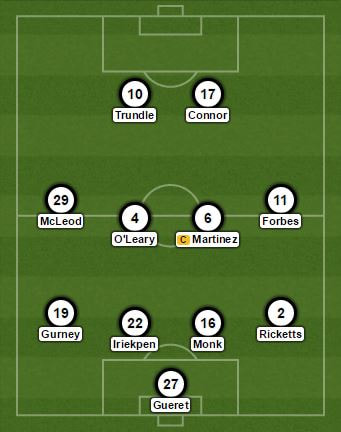 Swans line-up vs. Shrewsbury Town, 30th April 2005
Swans line-up vs. Shrewsbury Town, 30th April 2005
Perhaps it was the fact that a throng of Swans legends – Mel Nurse, Alan Curtis and John Toshack amongst them – had just completed a lap of honour to rapturous applause, or maybe it was the entire occasion that got to them, but the team Jackett sent out on that April afternoon just couldn’t produce the vintage display that the Vetch deserved. Looking more like a mid-table side than one that was pushing for automatic promotion, not even an early strike from Adrian Forbes could spark the Swans into life – though it did have a considerable effect on the black and white masses in the stands. Collecting the ball midway into the opposition’s half, Kevin McLeod played a measured pass into the path of Forbes on the right, and the hard-working midfielder smashed a shot past an 18-year-old Joe Hart in the Shrewsbury goal to make it 1–0 after just 8 minutes played.
With the Vetch crowd eager to continue the celebratory atmosphere it had enjoyed before kick-off, that goal from Forbes should have opened the floodgates against a Shrewsbury side that had struggled to acclimatise to League Two following their promotion from the Conference. But the Swans failed to deliver any sort of final flourish, leaving their fans to enjoy the day purely for its sense of occasion, rather than for any of the football on show. Even Lee Trundle wilted in the spring heat, his box of tricks kept closed during an uncharacteristically-ineffective display.
Had Shrewsbury’s Kelvin Langmead not sent a point-blank header straight into the arms of Willy Gueret at the death, Jackett may have continued to rue his team’s failure to capitalise on results going in their favour elsewhere. But thanks to that late save from the Frenchman, Forbes’ strike was enough to see the Swans record one last success in the league at their beloved tin shed – a win that, coupled with Southend’s 1–0 loss at home to Yeovil, would put them level on points with the Shrimpers in 3rd with just one game left to play.
With the Vetch crowd eager to continue the celebratory atmosphere it had enjoyed before kick-off, that goal from Forbes should have opened the floodgates against a Shrewsbury side that had struggled to acclimatise to League Two following their promotion from the Conference. But the Swans failed to deliver any sort of final flourish, leaving their fans to enjoy the day purely for its sense of occasion, rather than for any of the football on show. Even Lee Trundle wilted in the spring heat, his box of tricks kept closed during an uncharacteristically-ineffective display.
Had Shrewsbury’s Kelvin Langmead not sent a point-blank header straight into the arms of Willy Gueret at the death, Jackett may have continued to rue his team’s failure to capitalise on results going in their favour elsewhere. But thanks to that late save from the Frenchman, Forbes’ strike was enough to see the Swans record one last success in the league at their beloved tin shed – a win that, coupled with Southend’s 1–0 loss at home to Yeovil, would put them level on points with the Shrimpers in 3rd with just one game left to play.
Despite the fact that nothing would be settled on the pitch that day, an invasion from the stands at the final whistle was inevitable. Buoyed by the win, the Jack Army soaked up what was left of the atmosphere, posing for photographs on the hallowed turf before gathering below the Centre Stand for the return of the players. After a short period of chanting, Kenny Jackett emerged from the changing room below and was handed a microphone, though it was clear he didn’t quite know what to say to the 10,000+ people who had just rushed onto the pitch with nothing particular to celebrate. I can’t remember exactly what was said in Kenny's rousing speech that afternoon (although I did hear that Mel Gibson auditioned to play him in Jack to a King), but his sentiments were echoed in an interview with the South Wales Evening Post following the match:
"It’s strange really. All the fans came onto the pitch at the end and usually by this stage everything is pretty much decided, but our season is still ahead of us."
– Kenny Jackett
The events of April 2005, the penultimate month of that historic final campaign, had posed many questions, but delivered little in the form of answers. As Swans fans trickled out of the ground onto the streets at the end of that blisteringly-hot April afternoon, nobody knew for sure if we had just said goodbye to league football at the Vetch. The possibility of the play-offs still loomed large. And would the shiny new stadium down the road in Landore host the likes of Nottingham Forest and Sheffield Wednesday during its inaugural season, or Boston United and Mansfield Town?
One thing was for sure: the month of May would have answers at its end – and tears on the North Bank, one way or another.
One thing was for sure: the month of May would have answers at its end – and tears on the North Bank, one way or another.
Bury 0–1 Swansea City, 7th May 2005
When Manchester City won the Premier League title in the final seconds of the 2011/12 season, the lasting memory for me – beyond the scenes of delirium at the Etihad – was of a Manchester United fan at Sunderland with his hand cupped to an ear-plugged ear, grimacing as he realised that he was about to be the bearer of very bad news to 2,600 other people. Until the dawn of the smartphone, the portable radio was the key accessory for fans on the final day of the league season. That frowning Red Devil at the Stadium of Light was probably plugged into an app on his phone, but 10 years ago – for fans of teams who needed results elsewhere to go their way – it was still a case of nicking the batteries out of the television remote and trying to jam that shower radio your nan bought you for Christmas into the pocket of your jeans.
On 7th May 2005, with two eyes on the unfolding events on the Gigg Lane pitch before us, myself and around 4,999 other travelling Jacks were tuned in – in one way or another – to three additional matches elsewhere, although we only needed one of those three to go our way (with a swing in goal difference also required if the Swans were to catch Yeovil). Despite the possible permutations of that final afternoon’s results being enough to make Carol Vorderman weep, automatic promotion to League One was still very much in the sights of Kenny Jackett’s men as they stepped out in front of that incredible 5,000-strong away support in Greater Manchester.
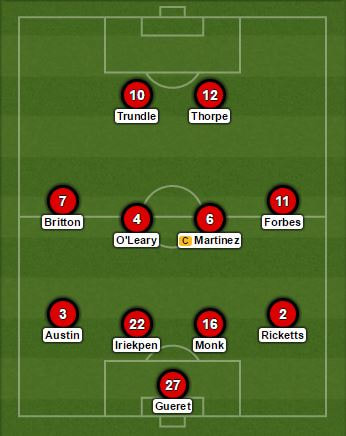 Swans line-up vs. Bury, 7th May 2005
Swans line-up vs. Bury, 7th May 2005
Following the success of the previous week’s call for everyone to wear black and white for the Vetch Field’s final league fixture – a crucial 1–0 win over Shrewsbury – the club had challenged fans to "turn Gigg Lane red" (the colour of the Swans away kit). It was a challenge readily accepted, and must have been quite a sight for the locals as the Jack Army poured out of their coaches and began to paint their town. Relations between home and away support was already strained before kick-off, however, with some Bury season ticket holders having to give up their usual seats due to the sheer volume of support from south Wales. Things were about to get worse. After just 26 seconds, Adrian Forbes latched on to a Kris O’Leary clearance and smashed the ball past future Welsh cap Glyn Garner – an almost carbon copy of his winning goal against Shrewsbury a week earlier.
Cue absolute bedlam.
The nervous energy built up during the four hour trip from SA1 to BL9 found an outlet, spilling forth from the stands in the form of a mini pitch invasion, much to the disgust of the 2,500 Bury fans dotted around the ground. It wouldn’t be the last stoppage caused by the travelling Jacks. The reaction to Forbes’ early goal set a precedent, and further distractions – including the retrieval of a mobile phone from Garner’s penalty area – turned what would have been a nervous 89 minutes and 34 seconds into an excruciating 102 minutes after time added on.
Though good chances came and went for Martinez and Trundle, it seemed that Jackett’s intention was to defend his team’s advantage – a task admirably undertaken by a back line of Gueret, Austin, Iriekpen, Monk and Ricketts. Of course, the fact that the Swans were able to hold on to their early lead wouldn’t have meant a thing had one result not been going their way elsewhere. Thankfully, Southend were being held to a 1–1 draw at Grimsby, although one goal at the wrong end in either game could still swing it in the Essex boys’ favour. As the number of minutes on the Gigg Lane scoreboard climbed slowly up to 90, those who had jammed portable radios into their pockets kept one ear firmly in Lincolnshire.
Due to the earlier stoppages caused by the over-excited Jack Army, the final whistle at Blundell Park sounded earlier than the one at Gigg Lane. As news filtered through that Southend would end the season on 78 points, Swans fans breached the lines of high-vis jackets once more, awaiting the sweet release of the referee’s final whistle and, with it, promotion to League One. But the final whistle at Gigg Lane wasn’t forthcoming, with the man in black instead putting a halt to the match and threatening to take the players off the pitch.
The replacement of leading goalscorer Trundle with Kevin McLeod on 68 minutes had raised more than a few eyebrows, but perhaps it was because Jackett had realised he might need to employ Magic Daps in a different role. With the Bury players more than willing to depart, and scuffles breaking out between the two dugouts, there was a definite fear amongst the Swans fans left in the stands that the game might be abandoned with seconds left to play. Would the 1–0 result still stand? As the afternoon descended into farce, Jackett sent Trundle over to the premature pitch invaders to try to calm them down. Eventually LT10 worked his magic and, after one final chance for Forbes, the referee blew his whistle. The Jacks were going up.
Cue absolute bedlam.
The nervous energy built up during the four hour trip from SA1 to BL9 found an outlet, spilling forth from the stands in the form of a mini pitch invasion, much to the disgust of the 2,500 Bury fans dotted around the ground. It wouldn’t be the last stoppage caused by the travelling Jacks. The reaction to Forbes’ early goal set a precedent, and further distractions – including the retrieval of a mobile phone from Garner’s penalty area – turned what would have been a nervous 89 minutes and 34 seconds into an excruciating 102 minutes after time added on.
Though good chances came and went for Martinez and Trundle, it seemed that Jackett’s intention was to defend his team’s advantage – a task admirably undertaken by a back line of Gueret, Austin, Iriekpen, Monk and Ricketts. Of course, the fact that the Swans were able to hold on to their early lead wouldn’t have meant a thing had one result not been going their way elsewhere. Thankfully, Southend were being held to a 1–1 draw at Grimsby, although one goal at the wrong end in either game could still swing it in the Essex boys’ favour. As the number of minutes on the Gigg Lane scoreboard climbed slowly up to 90, those who had jammed portable radios into their pockets kept one ear firmly in Lincolnshire.
Due to the earlier stoppages caused by the over-excited Jack Army, the final whistle at Blundell Park sounded earlier than the one at Gigg Lane. As news filtered through that Southend would end the season on 78 points, Swans fans breached the lines of high-vis jackets once more, awaiting the sweet release of the referee’s final whistle and, with it, promotion to League One. But the final whistle at Gigg Lane wasn’t forthcoming, with the man in black instead putting a halt to the match and threatening to take the players off the pitch.
The replacement of leading goalscorer Trundle with Kevin McLeod on 68 minutes had raised more than a few eyebrows, but perhaps it was because Jackett had realised he might need to employ Magic Daps in a different role. With the Bury players more than willing to depart, and scuffles breaking out between the two dugouts, there was a definite fear amongst the Swans fans left in the stands that the game might be abandoned with seconds left to play. Would the 1–0 result still stand? As the afternoon descended into farce, Jackett sent Trundle over to the premature pitch invaders to try to calm them down. Eventually LT10 worked his magic and, after one final chance for Forbes, the referee blew his whistle. The Jacks were going up.
The farce wasn’t over though, with some ill-advised members of Greater Manchester Police deciding that Swansea’s players – who were now spraying champagne on their fans from the Gigg Lane Centre Stand – were being a little overzealous in their celebrations. The GMP’s involvement lead to an altercation between a police officer and the Swans’ French goalkeeper Willy Gueret, who was then led off in handcuffs to chants of "Free Willy!" from the Swans fans on the pitch below.
“Talk about drama. We don’t do anything easy or straightforward at Swansea. That’s why you all come.”
– Kenny Jackett
Though Jackett’s words at the end of that dramatic day in Lancashire pre-echoed those of Garry Monk in a post-match interview at Wembley just six short years later, it was the final thoughts of the Swansea captain that sent shivers up the spine, delivering a rallying call to a proud club that had been stuck in the doldrums for far too long.
“I think that the club can go all the way – I have seen it done in the past. I have been involved with football clubs with less history than Swansea City, and I believe the club can reach the Premiership. I can guarantee you that if everyone goes in the same direction, we could go all the way.”
– Roberto Martinez
With promotion to League One delivered in the Vetch Field’s final season, and the move to the shiny, new stadium in Landore just one game away, things were definitely looking up for a club that had almost dropped out of league football just two seasons previously.
But the Premier League? Surely that was just the stuff of dreams.
But the Premier League? Surely that was just the stuff of dreams.
Swansea City 2–1 Wrexham, 11th May 2005
At around 9pm on 11th May 2005, in front of a sea of pitch-invading supporters, Roberto Martinez lifted the FAW Premier Cup, having just captained his side to a 2–1 win over defending champions Wrexham. However, despite the fact that Martinez was the first Swan to skipper his team to a cup final victory in over a decade, not everybody’s eyes were on the Spaniard in the Centre Stand. There were other trophies on offer that night that were far more important than the bowling ball on a plinth that Martinez held in his hands: clumps of grass, snapped advertising hoardings and faded red plastic seats – mementos liberated by Swans fans so they could always remember the times they had spent at a rickety old football ground, way down by the sea.
These were the final moments of Swansea City’s 93-year stay at the Vetch Field. The events of the football match that had just taken place seemed irrelevant in comparison.
For over three quarters of the 2004/05 season – the ground’s last campaign before the Swans moved on to pastures new – the club had planned for the last home match of the league season to be a celebration of the Vetch. Then, on 9th March, Brian Murphy saved two penalties in a semi-final shootout against Total Network Solutions, and the Swans booked their place in the final of the FAW Premier Cup. They would also be hosts, meaning the Vetch Field would have at least two swan songs – one on the 30th April against league rivals Shrewsbury Town, and another against Wrexham in the cup final on the 11th May (thankfully the Swans dodged the possibility of a third ‘last’ game at the Vetch by winning promotion to League One automatically, avoiding the potential drama of a play-off semi-final second leg).
Though they may not have won it anywhere near as often as Wrexham and (whisper it) Cardiff, Swansea City have a Welsh Cup record to be proud of, having lifted the trophy on ten occasions before UEFA stopped clubs from outside the Welsh league system from taking part. However, going into the 2005 final, the Swans had never won the FAW Premier Cup – a competition created by the association in 1997 as a Welsh Cup replacement for its English-based teams. Regarded as a bit of a Mickey Mouse affair, in which the senior clubs regularly gave their second string an outing, the Premier Cup’s saving grace was the fact that the winners pocketed £100,000 – a figure not to be sniffed at for a club who had been dealing almost exclusively in free transfers and loan signings since the turn of the century.
These were the final moments of Swansea City’s 93-year stay at the Vetch Field. The events of the football match that had just taken place seemed irrelevant in comparison.
For over three quarters of the 2004/05 season – the ground’s last campaign before the Swans moved on to pastures new – the club had planned for the last home match of the league season to be a celebration of the Vetch. Then, on 9th March, Brian Murphy saved two penalties in a semi-final shootout against Total Network Solutions, and the Swans booked their place in the final of the FAW Premier Cup. They would also be hosts, meaning the Vetch Field would have at least two swan songs – one on the 30th April against league rivals Shrewsbury Town, and another against Wrexham in the cup final on the 11th May (thankfully the Swans dodged the possibility of a third ‘last’ game at the Vetch by winning promotion to League One automatically, avoiding the potential drama of a play-off semi-final second leg).
Though they may not have won it anywhere near as often as Wrexham and (whisper it) Cardiff, Swansea City have a Welsh Cup record to be proud of, having lifted the trophy on ten occasions before UEFA stopped clubs from outside the Welsh league system from taking part. However, going into the 2005 final, the Swans had never won the FAW Premier Cup – a competition created by the association in 1997 as a Welsh Cup replacement for its English-based teams. Regarded as a bit of a Mickey Mouse affair, in which the senior clubs regularly gave their second string an outing, the Premier Cup’s saving grace was the fact that the winners pocketed £100,000 – a figure not to be sniffed at for a club who had been dealing almost exclusively in free transfers and loan signings since the turn of the century.
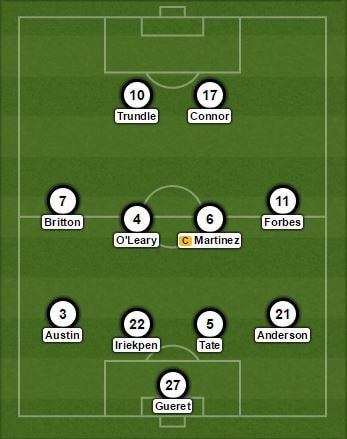 Swans line-up vs. Wrexham, 11th May 2005
Swans line-up vs. Wrexham, 11th May 2005
With thoughts of prize money, trophy cabinets and giving the Vetch Field a farewell to remember, Kenny Jackett sent out a strong side for the 6.55pm kick off on that warm, mid-noughties evening. Despite his heroics in the semi-final, there would be no place in the starting line-up for Brian Murphy, with Jackett instead electing to go with the freshly-bailed Willy Gueret between the sticks. Alan Tate, Ijah Anderson and Paul Connor came in for Garry Monk, Sam Ricketts and Lee Thorpe – but the team was otherwise unchanged from the one that had sealed promotion at Bury just four days earlier.
Recently relegated from the division the Swans now found themselves in (following a 10-point deduction for entering administration), 2004/05 had been an annus horribilis for opponents Wrexham. The form of Juan Ugarte had been one of very few highlights, the Spanish striker’s return of 24 goals – including 5 in a single match against Hartlepool – giving the Red Dragons something to shout about during a long, miserable season. Now they were looking for a Premier Cup pick-me-up – a sixth victory in a competition that they had dominated since winning its first final at the end of 1997/98.
And it was that man Ugarte who opened the scoring following a goalless first half, firing home his 25th of the season after an assist from future Swan Dennis Lawrence. But the Jack Army’s spirits wouldn’t be dampened – even with a trophy waiting at the sidelines for the winners, there was a feeling that this match was all about the Vetch. Though the atmosphere had been electric for the last league game against Shrewsbury, the uncertainty about the Swans’ final position in the table had meant that thoughts were very much concentrated on the performance on the pitch. Picking up the FAW Premier Cup and its £100k prize money would be nice, but not as essential as winning promotion in readiness for the move to the new stadium in Landore. The match against Wrexham was a last opportunity to breathe the old ground in, without too much concern about what was happening on the green rectangle at its centre.
The fact that not all eyes were on the pitch was probably a good thing, because the Swans had struggled to create openings all game, though Paul Connor and Izzy Iriekpen had both missed good chances. But, just as the 9,000-strong crowd was getting used to the idea that it would be the visitors celebrating at the end of the Vetch Field’s last fixture, Swansea’s much-celebrated number 10 rose to the occasion, taking the cup final by the scruff of the neck. Lee Trundle, clearly desperate to cement his place in the history books by being the last name on the Vetch scoresheet, instead broke the hearts of his former team by forcing an own goal and then setting up the winner. Following a run into the opposition’s penalty area, Trundle aimed a pass at his strike partner, but his cross met Shaun Pejic before Connor, with the Wrexham man heading into his own net in a failed attempt to clear. Then, with 15 minutes left on the clock and extra-time looming, a long ball from Gueret was expertly controlled by Trundle and slotted into the path of substitute Andy Robinson, whose volley was worthy of winning any cup final. Despite a late rally from Wrexham, the Swans held on and met the Vetch Field’s final final-whistle as FAW Premier Cup champions.
The pitch invasion at the end was inevitable, with fans desperate to grab a piece of their home from home to take home with them. Some had smuggled tools, though those who hadn’t improvised with makeshift spades and brute strength. By the time we had finished, the crumbling Vetch had become a carcass, picked clean by those who loved it most.
Had it remained at the Vetch Field, it’s very unlikely that the club would have risen as high as it has. The ‘glass ceiling’ of 8th place in the Premier League that we’ve heard a lot about recently may have been positioned considerably lower had modern facilities not been in place to attract a better calibre of player. In a newspaper interview at the end of that last season at the Vetch, Huw Jenkins suggested that:
Recently relegated from the division the Swans now found themselves in (following a 10-point deduction for entering administration), 2004/05 had been an annus horribilis for opponents Wrexham. The form of Juan Ugarte had been one of very few highlights, the Spanish striker’s return of 24 goals – including 5 in a single match against Hartlepool – giving the Red Dragons something to shout about during a long, miserable season. Now they were looking for a Premier Cup pick-me-up – a sixth victory in a competition that they had dominated since winning its first final at the end of 1997/98.
And it was that man Ugarte who opened the scoring following a goalless first half, firing home his 25th of the season after an assist from future Swan Dennis Lawrence. But the Jack Army’s spirits wouldn’t be dampened – even with a trophy waiting at the sidelines for the winners, there was a feeling that this match was all about the Vetch. Though the atmosphere had been electric for the last league game against Shrewsbury, the uncertainty about the Swans’ final position in the table had meant that thoughts were very much concentrated on the performance on the pitch. Picking up the FAW Premier Cup and its £100k prize money would be nice, but not as essential as winning promotion in readiness for the move to the new stadium in Landore. The match against Wrexham was a last opportunity to breathe the old ground in, without too much concern about what was happening on the green rectangle at its centre.
The fact that not all eyes were on the pitch was probably a good thing, because the Swans had struggled to create openings all game, though Paul Connor and Izzy Iriekpen had both missed good chances. But, just as the 9,000-strong crowd was getting used to the idea that it would be the visitors celebrating at the end of the Vetch Field’s last fixture, Swansea’s much-celebrated number 10 rose to the occasion, taking the cup final by the scruff of the neck. Lee Trundle, clearly desperate to cement his place in the history books by being the last name on the Vetch scoresheet, instead broke the hearts of his former team by forcing an own goal and then setting up the winner. Following a run into the opposition’s penalty area, Trundle aimed a pass at his strike partner, but his cross met Shaun Pejic before Connor, with the Wrexham man heading into his own net in a failed attempt to clear. Then, with 15 minutes left on the clock and extra-time looming, a long ball from Gueret was expertly controlled by Trundle and slotted into the path of substitute Andy Robinson, whose volley was worthy of winning any cup final. Despite a late rally from Wrexham, the Swans held on and met the Vetch Field’s final final-whistle as FAW Premier Cup champions.
The pitch invasion at the end was inevitable, with fans desperate to grab a piece of their home from home to take home with them. Some had smuggled tools, though those who hadn’t improvised with makeshift spades and brute strength. By the time we had finished, the crumbling Vetch had become a carcass, picked clean by those who loved it most.
Had it remained at the Vetch Field, it’s very unlikely that the club would have risen as high as it has. The ‘glass ceiling’ of 8th place in the Premier League that we’ve heard a lot about recently may have been positioned considerably lower had modern facilities not been in place to attract a better calibre of player. In a newspaper interview at the end of that last season at the Vetch, Huw Jenkins suggested that:
“People can get caught up in history and get sentimental, when really we’re talking about a place that should have been condemned years ago...we’ve had some great players and great managers over the years and there have been some special times...but there’s been a lot more failure...the new stadium is a dream we’ve had for 30 years, and it’s one I thought would never come true."
– Huw Jenkins
Of course, 10 years on, it’s even easier to romanticise those days at the Vetch, and forget that for every nostalgic sniff of bovril and fried onions, there was also a stream of urine making its way towards the pitch from the back of the North Bank – but that’s what the old football grounds were about: well-loved, well-worn tin sheds, cobbled together around a patch of grass where heroes were made.
The Vetch Field – in its best days and worst days – will always be a part of our club. Wherever we go, it’ll always be where we’ve come from.
And it should never be forgotten.
The Vetch Field – in its best days and worst days – will always be a part of our club. Wherever we go, it’ll always be where we’ve come from.
And it should never be forgotten.
Vetch Field Elegy
A poem about that final game at the Vetch Field, recorded for The Crunch in October 2015.

